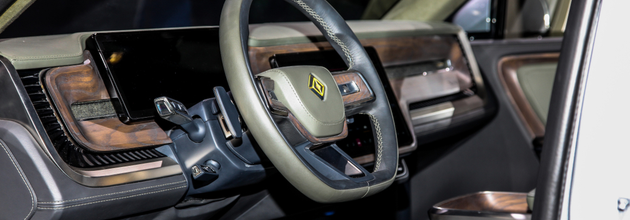
 | Read in Browser | |||||||||||
 | ||||||||||||
 | ||||||||||||
| ||||||||||||
"People are going back inside stores, and in-store dining is seeing record highs," DoorDash CEO Tony Xu said after the deal. "And so we are seeing a normalization of growth rates, but I think it's important to put this in context that delivery is here to stay."
Wave of consolidation: Last year, Grubhub agreed to merge with Europe's Just Eat Takeaway.com (GRUB), while Uber Eats (UBER) snatched smaller rival Postmates for $2.7B. (2 comments)
Download Seeking Alpha for your Phone or Tablet


Want More Ideas?
Our best ideas → Stock Ideas
ETF's Investing Ideas → ETF Ideas
Dividend stocks ideas → Dividend Ideas
This email was sent to you because you signed up to receive Wall Street Breakfast.
If you do not want to receive Wall Street Breakfast emails, click here to unsubscribe.
Sent by Seeking Alpha, 52 Vanderbilt Avenue, 13th floor, New York, NY 10017
Wave of consolidation: Last year, Grubhub agreed to merge with Europe's Just Eat Takeaway.com (GRUB), while Uber Eats (UBER) snatched smaller rival Postmates for $2.7B. (2 comments)
Today's Markets
In Asia, Japan -0.6%. Hong Kong +0.7%. China -0.4%. India -0.1%.
In Europe, at midday, London +0.5%. Paris -0.2%. Frankfurt flat.
Futures at 6:20, Dow -0.2%. S&P -0.3. Nasdaq -0.4%. Crude -0.6% at $83.69. Gold -0.2% at $1826.60. Bitcoin -1.4% at $66863.
Ten-year Treasury Yield +3 bps to 1.48%
In Europe, at midday, London +0.5%. Paris -0.2%. Frankfurt flat.
Futures at 6:20, Dow -0.2%. S&P -0.3. Nasdaq -0.4%. Crude -0.6% at $83.69. Gold -0.2% at $1826.60. Bitcoin -1.4% at $66863.
Ten-year Treasury Yield +3 bps to 1.48%
Today's Economic Calendar
7:00 MBA Mortgage Applications
8:30 Consumer Price Index
8:30 Initial Jobless Claims
10:00 Wholesale Inventories (Preliminary)
10:00 Atlanta Fed's Business Inflation Expectations
10:30 EIA Petroleum Inventories
12:00 PM EIA Natural Gas Inventory
1:00 PM Results of $25B, 30-Year Note Auction
2:00 PM Treasury Statement
Companies reporting earnings today »
8:30 Consumer Price Index
8:30 Initial Jobless Claims
10:00 Wholesale Inventories (Preliminary)
10:00 Atlanta Fed's Business Inflation Expectations
10:30 EIA Petroleum Inventories
12:00 PM EIA Natural Gas Inventory
1:00 PM Results of $25B, 30-Year Note Auction
2:00 PM Treasury Statement
Companies reporting earnings today »
What else is happening...
Amid big bull market, U.S. contends with a soaring Misery Index.
Pfizer (NYSE:PFE) asks FDA to expand COVID booster eligibility for all adults.
U.S. government to buy $1B more worth of Merck's (NYSE:MRK) COVID-19 pill.
Coinbase (NASDAQ:COIN) slides after Q3 results reflect declining crypto prices.
Amazon (NASDAQ:AMZN) in talks to settle EU antitrust investigations - Reuters.
Monday.com (NASDAQ:MNDY) hits new high before earnings, up 190% since June IPO.
Royal Caribbean's (NYSE:RCL) long-time CEO Richard Fain to step down.
'Squid Game' creator says Netflix (NASDAQ:NFLX) will bring a second season.
U.S. energy report sees oil market oversupplied by early next year.
Tesla (NASDAQ:TSLA) tanks on insider selling worries; Musk loses $50B in two days.
Pfizer (NYSE:PFE) asks FDA to expand COVID booster eligibility for all adults.
U.S. government to buy $1B more worth of Merck's (NYSE:MRK) COVID-19 pill.
Coinbase (NASDAQ:COIN) slides after Q3 results reflect declining crypto prices.
Amazon (NASDAQ:AMZN) in talks to settle EU antitrust investigations - Reuters.
Monday.com (NASDAQ:MNDY) hits new high before earnings, up 190% since June IPO.
Royal Caribbean's (NYSE:RCL) long-time CEO Richard Fain to step down.
'Squid Game' creator says Netflix (NASDAQ:NFLX) will bring a second season.
U.S. energy report sees oil market oversupplied by early next year.
Tesla (NASDAQ:TSLA) tanks on insider selling worries; Musk loses $50B in two days.


Want More Ideas?
Our best ideas → Stock Ideas
ETF's Investing Ideas → ETF Ideas
Dividend stocks ideas → Dividend Ideas
This email was sent to you because you signed up to receive Wall Street Breakfast.
If you do not want to receive Wall Street Breakfast emails, click here to unsubscribe.
Sent by Seeking Alpha, 52 Vanderbilt Avenue, 13th floor, New York, NY 10017






EmoticonEmoticon